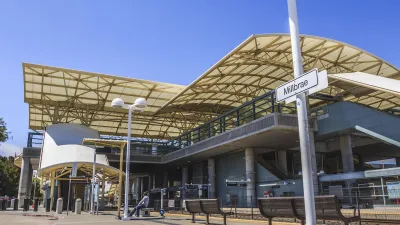Siemens has retrofitted trains for cold Russian winters; they are being rolled out now between Moscow and St. Petersburg and could be a model for American HSR.
"This December, high-speed trains designed by the German conglomerate and adapted for Russian winters will ply the rails between St. Petersburg and Moscow. But Siemens hopes their final destination will be the last laggard of the high-speed age: the United States.
"For years, businesspeople and politicians have dreamed about America entering the high-speed era, but Amtrak has been plagued by budget and service problems and the closest Americans have come to high speed is the Acela, which rarely runs at what Europeans call high speed."
"In Russia, it took a decade of on-again, off-again talks before Siemens signed a deal with the state railways in 2006 amid a general thaw in relations between Germany and Russia.
"Here as elsewhere, high-speed trains will compete with airlines. The 401-mile trip from downtown Moscow to downtown St. Petersburg will be 3 hours and 45 minutes. The average flying travel time is five hours, including the trips to and from the airport, check-in and security clearance.
"The four-times-a-day service will trim 45 minutes from the fastest train service now. To achieve this, the Russian state railway spent $485 million upgrading the track and $926 million for eight Sapsan trains and a 30-year service agreement, at today's exchange rates."
Thanks to Frances Cunningham Ritchie
FULL STORY: Siemens Fills Russia’s Need for High-Speed Train

Planetizen Federal Action Tracker
A weekly monitor of how Trump’s orders and actions are impacting planners and planning in America.

Maui's Vacation Rental Debate Turns Ugly
Verbal attacks, misinformation campaigns and fistfights plague a high-stakes debate to convert thousands of vacation rentals into long-term housing.

Restaurant Patios Were a Pandemic Win — Why Were They so Hard to Keep?
Social distancing requirements and changes in travel patterns prompted cities to pilot new uses for street and sidewalk space. Then it got complicated.

In California Battle of Housing vs. Environment, Housing Just Won
A new state law significantly limits the power of CEQA, an environmental review law that served as a powerful tool for blocking new development.

Boulder Eliminates Parking Minimums Citywide
Officials estimate the cost of building a single underground parking space at up to $100,000.

Orange County, Florida Adopts Largest US “Sprawl Repair” Code
The ‘Orange Code’ seeks to rectify decades of sprawl-inducing, car-oriented development.
Urban Design for Planners 1: Software Tools
This six-course series explores essential urban design concepts using open source software and equips planners with the tools they need to participate fully in the urban design process.
Planning for Universal Design
Learn the tools for implementing Universal Design in planning regulations.
Heyer Gruel & Associates PA
JM Goldson LLC
Custer County Colorado
City of Camden Redevelopment Agency
City of Astoria
Transportation Research & Education Center (TREC) at Portland State University
Jefferson Parish Government
Camden Redevelopment Agency
City of Claremont





























